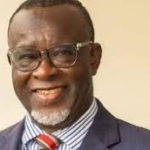
The vetting of Chief Justice nominee Justice Paul Baffoe-Bonnie before a politically divided Parliament moved beyond a simple constitutional process; it became a full-blown political battleground. This battle highlighted Ghana’s fractured judiciary and a severe crisis of public confidence. The dramatic walkout by the Minority Caucus, led by Alexander Afenyo-Markin, signalled that the appointment process was inextricably tied to the controversial removal of former Chief Justice Gertrude Torkornoo, which the opposition New Patriotic Party (NPP) faction viewed as a “travesty of justice.”
The Torkornoo Precedent: How the crisis began
The current political and constitutional tension stems directly from the removal of Justice Gertrude Torkornoo, whose official tenure ended on September 1, 2025. This precedent cast a long shadow over the vetting, challenging the integrity of the process before it even began. The opposition Minority viewed the process as deeply flawed, a position supported by the former Chief Justice herself. She had filed legal challenges publicly labelling the proceedings against her as “unconstitutional” and “politically driven.” This statement framed the subsequent appointment not as an administrative action, but as a continuation of political rivalry, further eroding public trust in the neutrality of the executive.
Partisan showdown over constitutional process
The National Democratic Congress (NDC), currently in the Majority, was intent on fast-tracking the nomination by President John Dramani Mahama to establish judicial leadership ahead of critical political cycles. The vetting was successfully held on November 10, 2025, despite procedural challenges. Mahama Ayariga, the Majority Leader, staunchly defended the committee’s decision to proceed, insisting, “I am objecting to the use of the term ‘disputed nominee’ because there is no dispute before this House.” Conversely, the Minority’s aggressive stance and walkout were framed by the NDC as partisan obstructionism aimed at delaying a vital appointment. Afenyo-Markin argued for the Minority’s right to protest; NPP lawmakers filed a formal motion to the Speaker asking to halt the process, but the motion was not accepted.
The constitutional deadlock centred on the report of the Justice Gabriel Pwamang investigative committee, which provided the basis for the removal. Appointments Committee Chairman Bernard Ahiafor had previously attempted to enforce the rules, ordering that references to the committee and Justice Pwamang be expunged from the record, noting, “Anything relating to the committee and Justice Pwamang is expunged from the records.” This definitive approach, backed by the Majority, ensured the vetting proceeded. The public perceived the removal of Justice Torkornoo as politically motivated, with some governance experts describing it as “sweet revenge or political payback.”
Vetting Outcome: Parliament approves, crisis averts?
In a critical development that resolved the parliamentary impasse, Parliament’s Appointments Committee approved Justice Paul Baffoe-Bonnie as the substantive Chief Justice on November 10, 2025. This confirmation followed a session marked by intense scrutiny but ultimately resulted in bipartisan support from the committee’s members. Crucially, former Chief Justice Gertrude Torkornoo’s legal team filed a statement confirming the withdrawal of her outstanding legal challenges, signaling her acceptance of the constitutional process and endorsing the appointment. The successful confirmation reinforces the government’s commitment to judicial stability, but the high degree of political controversy surrounding the process ensures the “integrity crisis” remains a key challenge for the new Chief Justice.
The Final Step: Swearing-in anticipated
The confirmation by the Appointments Committee has cleared the final political hurdles. Justice Paul Baffoe-Bonnie’s formal swearing-in is the final constitutional step anticipated this week. The full Parliament is expected to adopt the committee’s report, paving the way for the President to administer the oaths of office. This transition marks the official end of the procedural crisis and the beginning of the new Chief Justice’s battle to restore the integrity of the courts.
Justice Baffoe-Bonnie’s dual mandate and personal integrity
Justice Paul Baffoe-Bonnie’s testimony revealed a nominee acutely aware of the systemic challenges he faces. He acknowledged, “People have lost confidence in the judiciary because they think it is corrupt and I don’t know where they are getting this from,” committing to “catch the bad nuts” to restore trust. This focus is critical, as recent Afrobarometer data indicates that 85% of Ghanaians say at least “some” judges and magistrates are corrupt, with 40% saying “most” or “all” are corrupt, a sentiment fueled by inconsistent rulings in high-profile political cases. The Transparency International’s Corruption Perception Index further supports this, showing Ghana’s score has dropped to 42, its worst ranking in five years.
To counter the political skepticism, the nominee strategically presented his 33-year judicial tenure as proof of character. He highlighted his decision to leave the Prison Service after meeting his future wife, now Director-General Patience Baffoe-Bonnie, to comply with an internal regulation. “So I opted out of the Prison Service so that she could stay,” he shared, demonstrating a personal sacrifice for the greater good of another’s career. His explanation of the 70-year sentence for notorious armed robber Ayi Ayeetey (Atta Ayi) provided a controversial illustration of judicial discretion. The nominee stated, “if Atta Ayi was given 30 years and he comes back, my family will be the first he will attack,” a comment that underscores the perception of a judiciary operating on personal protective reasoning rather than strict adherence to standardized guidelines.
This anecdote, combined with his proposal for 24-hour courts and moving the election date to November to accommodate petitions, shows a strong push for judicial efficiency and de-politicization of electoral justice. Crucially, he emphasized public sensitization on Alternative Dispute Resolution (ADR), alongside calling for the use of electronic means to serve court documents to reduce administrative delays.
Ghanaian citizens’ perspectives and regional implications
The drama in Parliament resonates deeply with ordinary Ghanaians, who view the judiciary’s struggle as a direct threat to the rule of law. The conversation on the street is split, with many feeling alienated by the political bickering.
A supporter of the vetting process, Kwame Antwi, a market trader, said, “They should just finish the vetting and let the man work. The courts are slow and full of problems, so let him start the job and fix it. This political drama is a waste of time.”
Conversely, Afua Serwah, a retired civil servant, expressed skepticism about the appointment’s legitimacy, stating, “The way the last Chief Justice was removed was not fair. If the beginning of the process is wrong, how can we trust the new person? They must sort out the law first, not rush for political gain.”
A neutral observer, student Emefa Adom, captured the wider sentiment, commenting, “It’s hard to have faith. The politicians are fighting about who gets to control the judges, not about making justice better for us, the people. Until they clean up the corruption, the judges will always be puppets.”
The ultimate success of Justice Baffoe-Bonnie, now the confirmed Chief Justice, will be measured not just by his proposed reforms, but by his ability to navigate this deep political chasm and genuinely tackle a public trust crisis. For the international community and African observers, this episode serves as a powerful reminder of the fragility of judicial independence when executive and legislative politics collide, particularly ahead of a major election. If left unaddressed, the current distrust could lead to a permanent loss of faith in the constitutional process, a dangerous outcome for any democracy.




